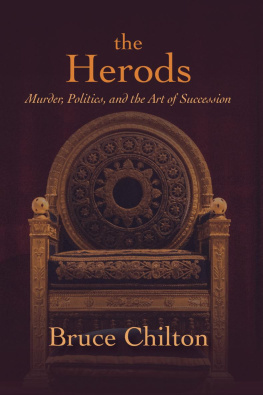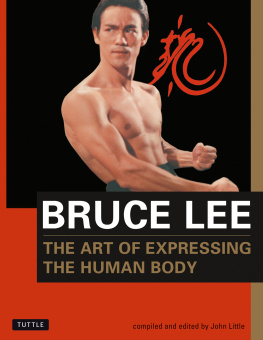the
Herods
the
Herods
Murder, Politics, and the Art of Succession
Bruce Chilton
Fortress Press
Minneapolis
THE HERODS
Murder, Politics, and the Art of Succession
Copyright 2021 Fortress Press, an imprint of 1517 Media. All rights reserved. Except for brief quotations in critical articles or reviews, no part of this book may be reproduced in any manner without prior written permission from the publisher. Email or write to Permissions, Fortress Press, PO Box 1209, Minneapolis, MN 55440-1209.
All Scripture quotations are the work of the author. All rights reserved worldwide.
Cover image: Photo by William Krause on Unsplash
Cover design: Landerholm
Print ISBN: 978-1-5064-7428-1
eBook ISBN: 978-1-5064-7429-8
While the author and 1517 Media have confirmed that all references to website addresses (URLs) were accurate at the time of writing, URLs may have expired or changed since the manuscript was prepared.
Contents
The Herodian dynasty was complex, conflicted, and compelling; so is the considerable scholarship that approaches the vivid figures responsible for its emergence and demise. I would not have taken up the issue of the Herodians impact on governance without considerable encouragement, moral support, and practical help from many colleagues. An afternoons conversation with Joan Bingham brought vividly alive the interest that Herod the Great, always the center of the narrative, could evoke in acute readers. A series of experimental forays, guided by Gail Ross and Ken Wapner, led to the conclusion that the issue of governance was much larger than Herod himself (big though he was) and that the arc of the dynasty needs to be traced for its political impact to be assessed.
Just as this finding came home to me, I was finishing my study of the resurrection of Jesus, another topic whose complexity is a challenge. The editor, Carey Newman, exerted a catalytic influence on my address of the issues involved and my approach to presenting them. In the case of the Herodians, Careys contribution has been even greater, as we have devised a way to coordinate the moving parts of the Herodian machine. In deciding how to anticipate readers interests, as well as where to explain more and where to leave matters for inference, I have been greatly helped by Francis Karagodins, a student at Bard College, as well as by Carey. Francis read the proofs of Resurrection Logic, showing editorial skills in the process, so it was natural to involve him earlier on in the composition of The Herods: Murder, Politics, and the Art of Succession. Library staff at Bard College have provided me with unfailing support, even during the worst days of the pandemic in New York State. The director, Betsy Cawley, provides an example of how institutions, however stressed, need not fail under the pressure of events.
In taking on authorly accountability for the inevitable faults that works of history are heir to, I am heartened that I have no responsibility whatever for the lapses of Josephus, the principal source for all work of this kind. These are so striking that a scholarly literature, some of it cited here, has developed to account for all his apparent btises. Typically, the problem is addressed by considering his perspective first and then applying that analysis to what Josephus says. Here I prefer to analyze his individual assertions of fact before coming to an assessment in regard to his aims (which appears in the epilogue). Since he was himself a political player and militant leader near the end of the events he narrates, his actionslike those of the Herodians he both admired and criticizedshaped his preferred theory of governance at least as much as his theory guided his actions. Power (like the resurrection) generates its own characteristic logic, in the first century as in the twenty-first.
Bruce Chilton
Feast of Aidan of Lindisfarne
In August 2000, I went swimming for the first time in the Mediterranean Sea at the beach in Tel Aviv. On an oppressively hot and humid day, signs posted in Hebrew on jetties along the beach cautioned against going in the water and warned that there was no lifeguard. Still, the weather was too stifling to ignore the lure of the impressive waves that crushed in. Because I grew up on Long Island, I have a long-standing habit both of appreciating opportunities to swim and of ignoring signs. In any case, there were some other swimmers that day already in the water, none of whom seemed to struggle.
The Mediterranean Sea has a different taste from the Long Island Sound or the Atlantic Ocean; the salt itself stings more on the tongue and the water is warmer. The waves that day were more distinctive still. Because the Mediterranean is long and relatively narrow and Tel Aviv sits on its eastern end, a storm far out of sight can whip up the impressive breakers that had drawn me into the water, and they are funneled toward the beach. In addition, the drop from the beach into the water is steeper than in the case of the Atlantic Ocean (and more like the Long Island Sound, with its smaller waves). As I found, once in the water, this makes for a strong shear of forces, with the waves tops pressing into the beach and an undertow dragging the broken waves back out. It did not take long for me to become much cooler, invigorated, but also quite tired, and I made my way back on foot through town.
The Herodian dynasty rolled through the lands of territorial Israel like a series of breakers. Herod the Great; his father, Antipater; Herods sons, Archelaus, Antipas, and Philip; his extraordinarily lucky grandson, Agrippa I; and his great-grandchildren, Berenik and Agrippa II were all forces unto themselves, breakers that threatened what stood in their way. Yet they also were part of a single dynastic complex, whose force is explicable not only in terms of their talent and ambition and drive (all of which remain astonishing) but also on the basis of Romes projection of its might, sometimes blatantly and to the point of violence, sometimes cloaked in the claims of legitimacy of local rulers like the Herodians who did their bidding. The breakers on the eastern end of the Mediterranean are absorbed back into the sea from which they emerged, and the Herodian dynasty by the end of the first century CE was submerged within the Roman imperium that had largely produced it. But in the caesura between their appearance and disappearance, the Herodians made their influence felt on their subjects, among whom were formative figures in the emergence of Judaism and Christianity.
Until his death in 4 BCE, Herod the Great ruled lands that included territories that once made up the kingdoms of Judea and Israel. Although he exercised his monarchy over a rich, strategically crucial territory, his royal title did not derive from heredity. His family came from the people of Idumea, ancient antagonists of the Israelites. Herod and his dynasty framed the basis of their authority at the same time that they ruled, wielding power ruthlessly to maintain and extend their hold on their often fractious, sometimes fiercely rebellious subjects.
Yet Herod ruled not as an outsider but on the basis of a family commitment to Judaism going back to his grandfather and his father. Three generations had served the priestly dynasty of the Maccabees that had submitted Idumea to their rule, helping implement the Maccabean version of what loyalty to the Torah required. Herods father, Antipater, rose not only to manage affairs on behalf of his priestly masters but to become a pivotal military leader. He inaugurated a new lineament of power: alliance with Rome in the persons of Pompey and Julius Caesar. In the crucible of civil war among Romans as the First Triumvirate broke up and international war between Rome and Parthia became ambient, Antipater managed to leave his sons with the prospect of a dynasty. With a dexterity that became a dynastic trait, Antipas managed to secure just enough stability to secure a position of governance within the volatile changes of political and military conditions.









